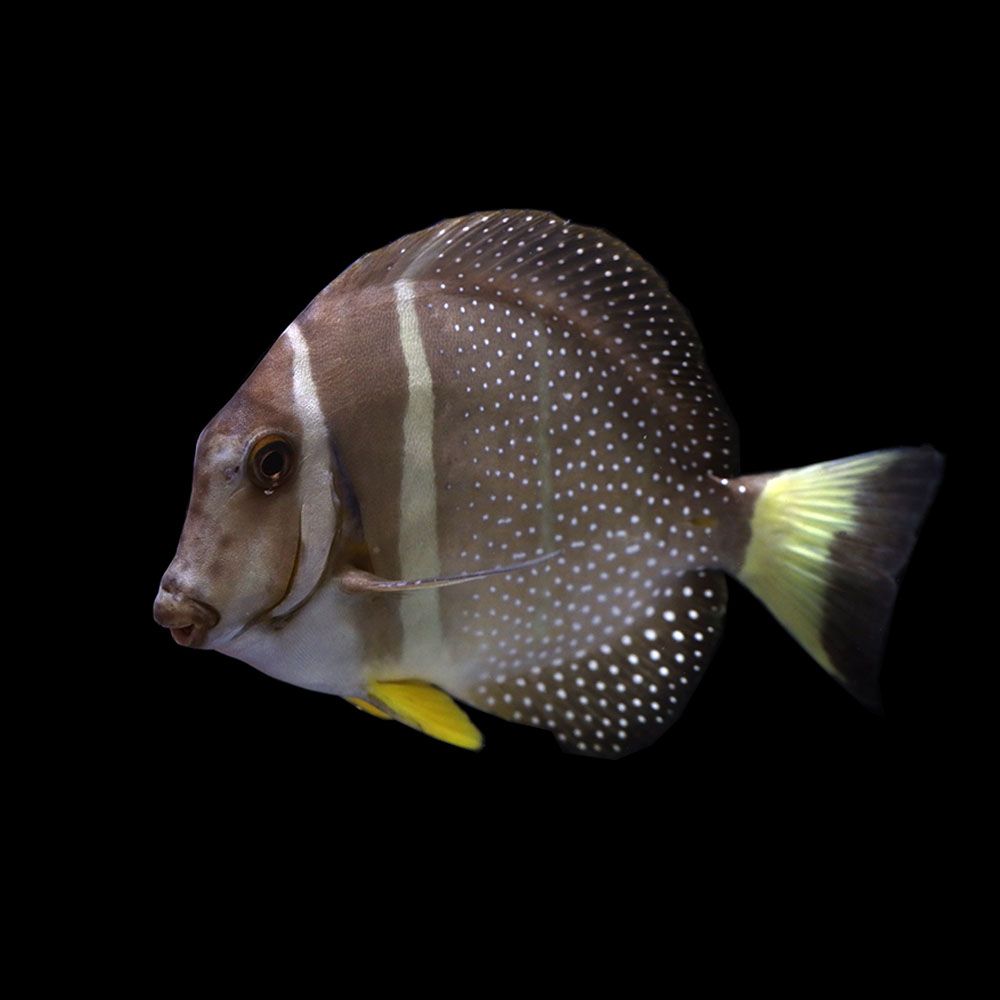ONLINE STORE MINI
Scroll down for a sneak peek at our online store. For full functionality and experience, click the button below to browse the full online store!!
Mustard Tang (Acanthurus guttatus)
Mustard Tang (Acanthurus guttatus)
Description:
Overview: The Mustard Tang, also known as the Whitespotted Surgeonfish or Spotted Tang, is a visually captivating and active species that adds a dynamic presence to any saltwater aquarium. Known for its striking coloration and hardy nature, the Mustard Tang is an excellent choice for both novice and experienced aquarists looking to enhance their marine display.
Appearance: The Mustard Tang is visually stunning, featuring a predominantly dark brown to black body adorned with numerous small white spots. The fins are edged with a vibrant mustard yellow, which contrasts beautifully with the dark body. This striking coloration, along with its sleek and elongated body shape, makes the Mustard Tang a standout in any marine tank.
Behavior: Mustard Tangs are known for their active swimming patterns and constant grazing behavior. They are generally peaceful but can be territorial, especially towards other tangs. They thrive in well-structured environments with plenty of live rock, caves, and open swimming areas. Mustard Tangs are known for their inquisitive nature and are often seen exploring their surroundings.
Diet: Mustard Tangs are primarily herbivores and thrive on a diet rich in marine algae. They will graze on algae growing in the tank and should be provided with a variety of seaweed and algae-based foods. Supplementing their diet with high-quality flake food, pellets, and occasional vegetable treats like blanched spinach or zucchini can help maintain their health and vibrant coloration.
Tank Requirements: Mustard Tangs require a spacious aquarium of at least 100 gallons to accommodate their active nature and need for grazing space. Providing plenty of live rock for hiding spots and grazing surfaces is essential. Maintaining optimal water quality and stable parameters is crucial for their well-being.
Tankmates: Mustard Tangs are generally peaceful but can be territorial towards other tangs, especially those of the same genus. Suitable tankmates include clownfish, gobies, angelfish, and other peaceful fish. Avoid housing them with overly aggressive species that may intimidate them or compete for food. This fish can be kept with other tangs of the same genus. It is advisable to introduce them all at the same time to an appropriately sized aquarium, usually 5 feet or longer. Ensure that algae and other food are not lacking to minimize aggression problems.
Reef Aquarium Compatibility: Mustard Tangs are reef-safe and do not harm corals or invertebrates. Their herbivorous diet helps control algae growth, making them a beneficial addition to reef aquariums.
Max Size: Mustard Tangs can grow up to 8 inches (20 cm) in length. Due to their active nature and need for grazing space, they require a spacious and well-maintained aquarium to thrive.
Origin: Mustard Tangs are commonly found in the Indo-Pacific region, particularly around the waters of the Great Barrier Reef, Indonesia, and the Philippines.
Sexual Dimorphism: Mustard Tangs do not exhibit significant sexual dimorphism, making it difficult to distinguish males from females based solely on appearance.
Interesting Facts:
- Mustard Tangs are known for their striking white spots and vibrant mustard yellow fins, making them a favorite among marine aquarists.
- They are relatively hardy and can adapt well to captivity with proper care and a well-maintained environment.
- Mustard Tangs are active swimmers and excellent algae grazers, helping to keep the aquarium clean and free of excess algae growth.
- Their peaceful nature and striking appearance make them a visually captivating addition to any marine tank.
Disclaimer: Aquarium Arts cannot guarantee compatibility with your current fish or the fish you buy and cannot be held liable for fish lost due to aggression.


